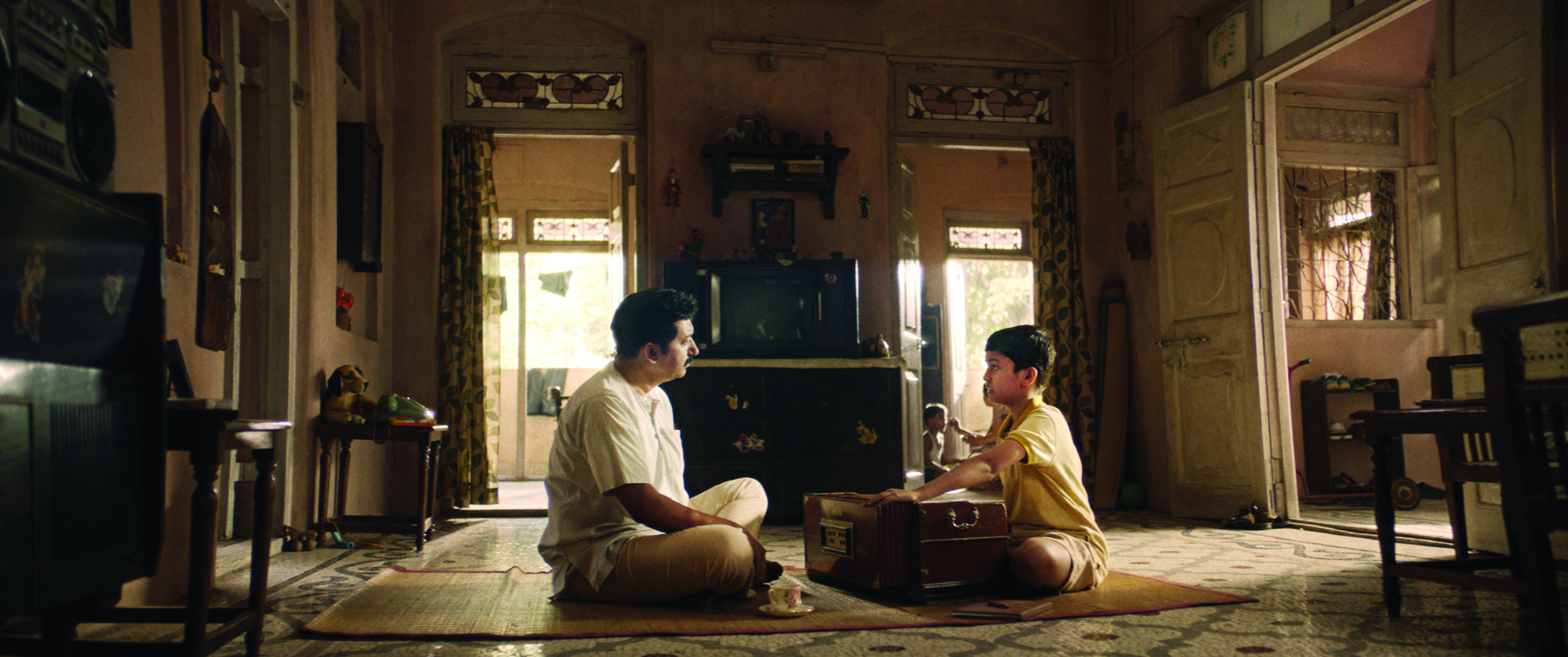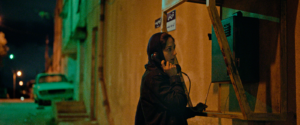When Chaitanya Tamhane was seventeen, he got a job writing scripts for TV soaps at the giant Indian production house Balaji Telefilms. When he was eighteen, something just as formative occurred: he got a DVD showcasing the work of magician David Copperfield. ‘I popped it in and I was completely mesmerised,’ recounts Tamhane.[1]Chaitanya Tamhane, quoted in Indulekha Aravind, ‘Now We Don’t Look at Cinema as an Art Form, but as Fast Food: Chaitanya Tamhane’, The Economic Times, updated 4 October 2020, <https://economictimes.indiatimes.com/magazines/panache/now-we-dont-look-at-cinema-as-an-art-form-but-as-fast-food-chaitanya-tamhane/articleshow/78459736.cms>, accessed 14 July 2021. While the 34-year-old has gone on to become a professional filmmaker, he’s remained an amateur enthusiast for magic: in 2015, he gave a promotional interview for his debut film, Court (2014), while at a magician’s convention;[2]Laya Maheshwari, ‘Why Court Writer and Director Chaitanya Tamhane Doesn’t Think You Can Judge His Intentions’, IndieWire, 14 July 2015, <https://www.indiewire.com/2015/07/why-court-writer-and-director-chaitanya-tamhane-doesnt-think-you-can-judge-his-intentions-247837/>, accessed 14 July 2021. and when filming wrapped on his second feature, The Disciple (2020), he flew to a magic convention in the UK the very next day.[3]Aravind, op. cit. For the director, his twin loves – each forms of illusion – are close kin. ‘I find a lot of similarities between cinema and magic,’ Tamhane reflects. ‘Cinema’s early pioneers were, in a sense, magicians too.’[4]Chaitanya Tamhane, quoted in Leonardo Goi, ‘Searching for the Truth: Chaitanya Tamhane on The Disciple’, Notebook, 14 October 2020, <https://mubi.com/notebook/posts/searching-for-the-truth-chaitanya-tamhane-on-the-disciple>, accessed 14 July 2021. And, as he points out, he’s not the only Indian auteur to have made this connection: ‘Some of the greatest Indian film-makers like Satyajit Ray were so fascinated by magic. Dadasaheb Phalke used to do magic shows, and he’s the father of Indian cinema.’[5]Tamhane, quoted in Aravind, op. cit.
Using the word ‘magical’ to describe a movie is a cliché, but so many tenets of magic – how it plays with perception, misdirection, trickery – are the same for cinema; Christopher Nolan’s duelling-magicians movie The Prestige (2006), for instance, is a singular meditation on this shared language. With The Disciple, Tamhane shows more of a magician’s flourish than he did with Court – a dramatic indictment of the Indian legal system that premiered at Venice in 2014, went on to receive numerous awards and brought the young filmmaker to the attention of Academy Award–winning Mexican director Alfonso Cuarón, who went on to mentor Tamhane and serve as executive producer for his second feature. Cuarón invited the young filmmaker onto the set of his sweeping, Oscar-nominated drama Roma (2018), and the experience emboldened him. ‘Watching someone […] so much in command on their craft, and also so generous when it comes to sharing [their] knowledge with me in an unpretentious way, I came back really grateful and as an enriched person,’ Tamhane has enthused.[6]Chaitanya Tamhane, quoted in Tatsam Mukherjee, ‘The Disciple Is an Expensive Film and I Was Allowed to Make It with Zero Compromises’, Firstpost.com, 29 April 2021, <https://www.firstpost.com/entertainment/the-disciple-is-an-expensive-film-and-i-was-allowed-to-make-it-with-zero-compromises-chaitanya-tamhane-8703021.html>, accessed 22 July 2021.
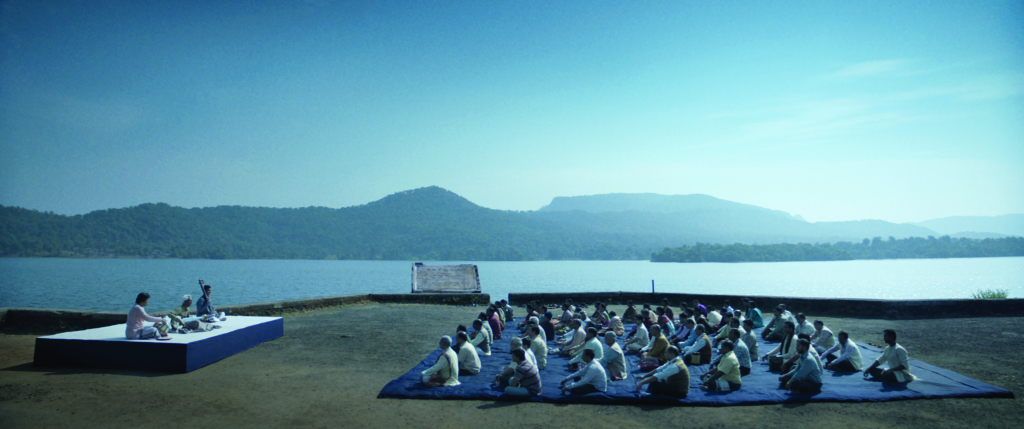
In The Disciple, you can see the inspiration from Roma in the steady motion of the camera: the long, lingering single takes in which we often slowly press in on the film’s titular and sole central character, Sharad (Aditya Modak), a devotee of Hindustani classical music, as he meditates or performs. In scattered scenes from his childhood, we see Sharad (played as a boy by Swarom Kulkarni) being indoctrinated by his father (Kiran Yadnyopavit), an enthusiast and historian who fills his son’s head with the folklore and mythos of this music. In the present – which is shown in two distinct timeframes, seemingly a decade apart – we see an adult Sharad playing at various small, local concerts, competitions and recitals: humble or run-down spaces that suggest the niche space Indian classical music occupies in contemporary Mumbai, as well as in the national cultural psyche. Not only is the cast filled with real-life musicians, but – so as to preserve the magic of the music – the production also captured all of its music really being performed; as producer Vivek Gomber has described it, the film’s entire aesthetic is at the service of evoking the meditative, transportive feeling of a performed raga.[7]See ‘Chaitanya Tamhane and Vivek Gomber on The Disciple’, IMDb on the Scene, 7 May 2021, <https://www.imdb.com/video/vi2832449561>, accessed 23 July 2021.
In The Disciple, you can see the inspiration from Roma in the steady motion of the camera: the long, lingering single takes in which we often slowly press in on Sharad as he meditates or performs.
Sharad studies under the tutelage of his ageing guru (Arun Dravid), but his greater devotion is to the mythical spectre of an obscure musician: a fictional figure known reverently as Maai, of whom both his father and his guru were disciples. In the most striking sequences of The Disciple, Sharad is on his motorcycle, riding through the Mumbai streets – usually at night – in ultra-slow motion. Over the sound of a sitar’s drone, we hear Maai (voiced by the late writer/director Sumitra Bhave, whose recent passing[8]See ‘Noted Marathi Filmmaker Sumitra Bhave Dies Due to Lung Infection’, Hindustan Times, 19 April 2021,
<https://www.hindustantimes.com/cities/pune-news/noted-marathi-filmmaker-sumitra-bhave-dies-due-to-lung-infection-101618807590321.html>, accessed 23 July 2021. adds real-life resonance to the notion of narration from beyond the grave) talking in a lecture, over crackles and hiss that betray the distant heritage of these tapes. No recordings of Maai performing were ever made, so Sharad clings to her every spoken word, their lyrical presentation on screen conveying that these recordings are the creed he lives by. Maai was an ascetic, for whom classical music was part of a greater spiritual worldview, and this comes across in both what she says and the visual language of these sequences – especially as the camera (Tamhane aided on this front by Polish DOP Michał Sobociński, a third-generation cinematographer whose father worked with Krzysztof Kieślowski[9]See Devarsi Ghosh, ‘“An Emotional, Universal Film”: Chaitanya Tamhane on His New Film The Disciple’, Scroll.in, 8 August 2020, <https://scroll.in/reel/969440/an-emotional-universal-film-chaitanya-tamhane-on-venice-bound-the-disciple>, accessed 23 July 2021.) feels as if it is floating above Sharad as he pilots through the long, dark night.
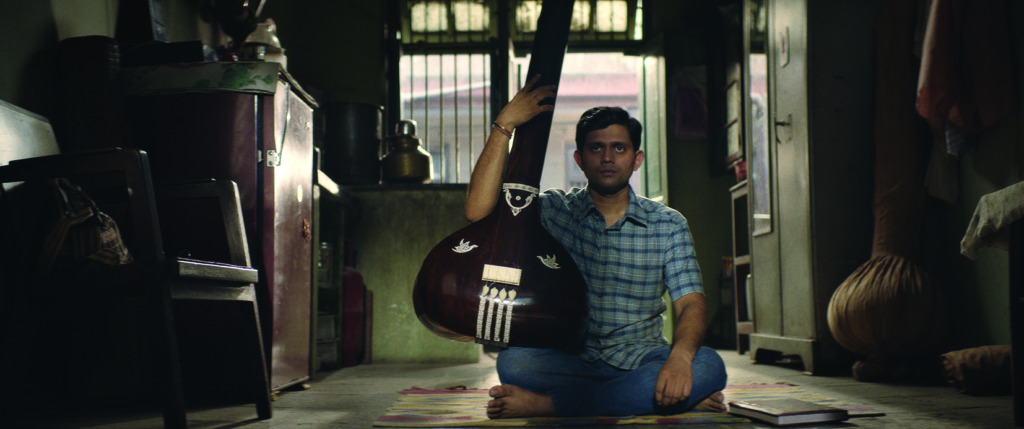
‘Saints and ascetics have attained this music after thousands of years of rigorous spiritual pursuit,’ Maai details, in one of the first things we hear her say. ‘It cannot be learnt so easily. Even ten lifetimes are not enough.’ In this telling, this music is a path to the divine – a way to achieve a pure state of mind. The Indian raga is a meditative musical form, its practitioners needing to purge their minds of ‘falsehood, greed and impure thoughts’; it should never be performed for the audience, but only for one’s guru, one’s god. A performer should have faith in Saraswati, the goddess of music. Study will be difficult, arduous, an undertaking of ‘endurance and perseverance’ in which one must stay the path no matter the temptations to be swayed, either to quit or seek success – it is, Maai expresses, a dual pursuit of technical proficiency and a greater truth. ‘Technique can be taught; truth cannot,’ she says. ‘For that, you must have the strength to look inwards with unflinching honesty. This is extremely difficult. It is a lifelong quest.’
The drama of The Disciple comes from its central character trying to live up to these holy edicts, to balance his pursuit of the spiritual with the more mundane realities of contemporary life. Its title evokes the archetype of the acolyte – someone who is a humbled figure of self-abnegation and devotion – but Tamhane always humanises his central character. Sharad is someone who can meditate or practise for hours, but who’s also jealous of rivals and socially awkward, and who’s not above nocturnal masturbation sessions in front of internet pornography. This disciple must traverse the vast gulfs between idealism and realism; between ‘the secret knowledge and the intimidating, complex art form’[10]Chaitanya Tamhane, quoted in Bedika, ‘Full-length Interview: Marathi Director Chaitanya Tamhane on Alfonso Cuaron’s Offer and His Film Court Winning Big at Venice’, The New Indian Express, 9 August 2020, <https://www.indulgexpress.com/entertainment/cinema/2020/aug/09/full-length-interview-marathi-director-chaitanya-tamhane-on-alfonso-cuarons-offer-and-his-film-cou-27212.html>, accessed 23 July 2021. he’s devoted to and its unheralded place in contemporary Indian culture; between his desire to become a musical master and the practicalities of needing to pay the bills. ‘He wants to achieve something that’s beyond worldly values, and at the same time, he also wants things everybody else is after. He struggles with sexual impulses, with a desire for fame and acceptance,’ offers Tamhane, of Sharad’s internal conflict. ‘I find that schism very fascinating. And I think many artists go through a similar crisis, sooner or later.’[11]Tamhane, quoted in Goi, op. cit.
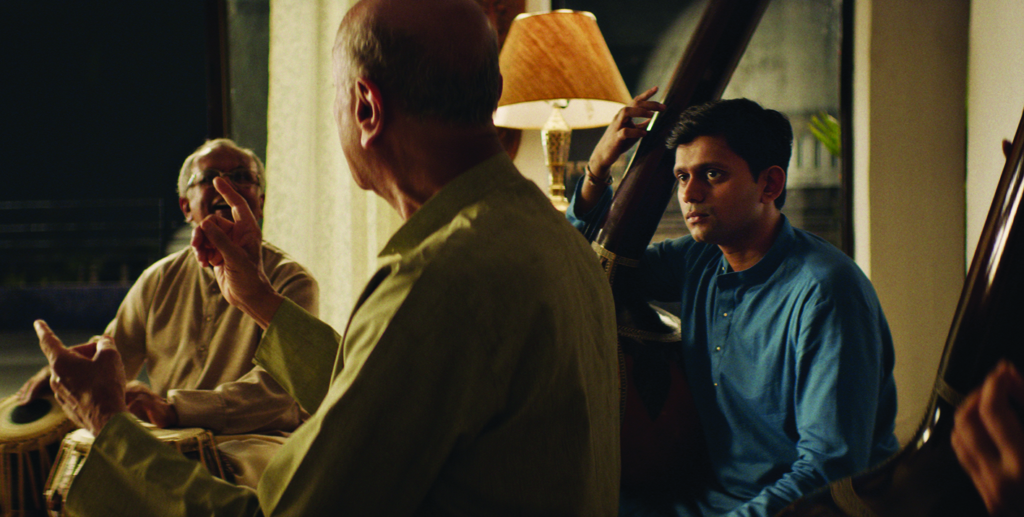
While there’s universality in this tale – ‘Despite being set in the world of Indian classical music,’ Tamhane says, ‘it could be about a poet, painter, athlete’[12]Chaitanya Tamhane, quoted in Devarsi Ghosh, op. cit. – its musical setting evokes other films about musicians. While a commonplace critical reference point has been Whiplash (Damien Chazelle, 2014),[13]See, for example, Deborah Young, ‘The Disciple: Film Review’, The Hollywood Reporter, 4 September 2020, <https://www.hollywoodreporter.com/movies/movie-reviews/the-disciple-film-review-venice-2020-4052937/>; and Kaleem Aftab, ‘The Disciple: Chaitanya Tamhane Considers the Limits of Control’, Sight & Sound, 8 October 2020, <https://www.bfi.org.uk/sight-and-sound/reviews/disciple-chaitanya-tamhane-indian-classical-music-vocalist-student>, both accessed 26 July 2021. the narrative similarities between the two are relatively superficial, with The Disciple sharing none of that movie’s swaggering machismo, nor its depiction of music as, essentially, yet another all-male form of cutthroat combat. A more fitting comparison is Inside Llewyn Davis (The Coen brothers, 2013), another picture in which a musician deals with disappointment and disillusionment. Each of these musicians, Sharad and the eponymous Llewyn Davis (Oscar Isaac), is so devoted to their at-times-haughty ideals of artistic purity that it proves an effective form of professional self-sabotage; and, in the face of a failing career, each must grapple with whether, ultimately, it is all worth it. As Tamhane so sagely notes, ‘We all start out as dreamers’;[14]Chaitanya Tamhane, quoted in Shilajit Mitra, ‘Chaitanya Tamhane on The Disciple: We All Start Out as Dreamers’, Cinema Express, 5 May 2021, <https://www.cinemaexpress.com/stories/interviews/2021/may/05/chaitanya-tamhane-on-the-disciple-we-all-start-out-as-dreamers-24341.html>, accessed 26 July 2021. and, in both his film and the Coens’ time-is-a-flat-circle masterwork, we walk a mile in the shoes of someone whose dreams haven’t come true.
The Disciple stages key parts of its narrative roughly a decade apart: Sharad at first a fresh-faced zealot in his twenties, wholly devoted to his study and love of this music; and then, later, an older, heavier, moustachioed man heading towards forty and middle age, where he’s an unsatisfied music teacher (not a guru) whose bright light is starting to fade. Long after this bifurcated narrative schism is introduced, we see – as, essentially, the climactic confrontation of the film – the inciting moment of his disillusionment: a scene in which The Disciple meets The Critic. The fictional character of renowned critic, scholar and collector Rajan Joshi (Prasad Vanarase) swans into a scene as a portly figure of evident wealth and arrogance, who speaks cynically and flippantly about the Indian classical music scene. His scorn extends to those figures whom Sharad, still young and ardent, verily worships: Rajan reveals Maai to have been not some saint, but someone who kept petty rivalries, was offensive and racist, and treated her disciples poorly. This is, effectively, one of the dominant cultural conversations of the twenty-first century – whether we can keep separating art from artist and continue to love Roman Polanski or Ezra Pound or Burzum, to say nothing of the endless cannibalism of cancel culture – functioning as the death of mythology, and of Sharad’s innocence. ‘Maai’s students painted her as this mythical creature,’ Rajan says, ‘[but] these new kids must know how to separate fact from fiction. The era is gone when people could inflate someone into a demigod.’
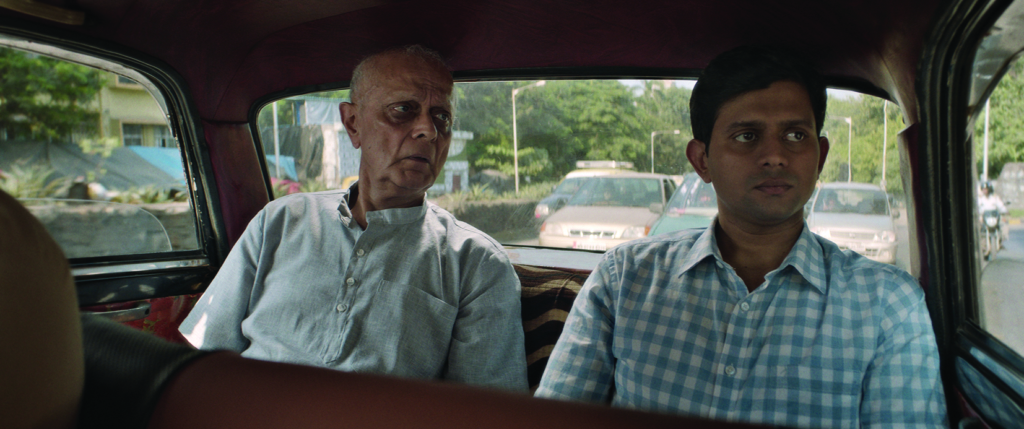
When the critic[15]Whom I, in defence of critics, see not as some villainous killer of dreams, but as a vessel delivering unvarnished truths. then dismisses Sharad’s own guru (‘he’s another fabricated story’) and the Maai recordings that’ve served as his religious text (‘I haven’t heard them yet, but I’m pretty sure it’s the most pretentious, self-righteous, elitist load of crock ever’), Sharad throws a drink in his face, the most dramatic moment in an otherwise staunchly reserved film – and one that evidently captures the instant in Sharad’s life in which the seeds of doubt were sown. In the later timeline, we see him donating the once-treasured Maai tapes to a disinterested library, and imagining a voiceover (matched to images showing no-longer-so-nostalgic memories of childhood father–son bonding) that mocks his father, dreams, failing pursuit of transcendence and devotion to a calling that doesn’t love him back. ‘How many years are you going to waste like this? How much longer? Do you want to end up like your father?’ Sharad hears Maai saying – his one-time spectral advice line transformed into withering, nightmarish, hallucinated critique.
Tamhane is yet another disciple trying to maintain the purity of his artistic output, to be allowed to pursue his dreams in the face of contemporary realities, to make something defiantly non-commercial yet still financially feasible.
For the filmmaker, this is where the personal comes in. Tamhane entered into The Disciple by first submerging himself in the world of classical music, an artistic realm he was entirely ignorant of beforehand. ‘I fell in love with the field because of all these stories, and secrets, this lost, ancient knowledge, and this complex, intimidating genre of music with roots in religion and spirituality,’ he conveys.[16]Tamhane, quoted in Mukherjee, op. cit. In this world and character alike, Tamhane channels many of his anxieties as a filmmaker: both in the way he feels his proficiency doesn’t measure up to his ardour[17]See Aravind, op. cit. and with regard to his own devotion to an ageing artform. ‘The Disciple is about the journey of a classical musician, but […] it’s very personal to my journey as a filmmaker,’ he relates. ‘I don’t think what’s happening to cinema as an art form in the 21st century is very different to what’s happening to music […] Cinema is also not relevant in the same way that it was.’[18]Chaitanya Tamhane, quoted in Priyanka Sharma, ‘The Disciple Director Chaitanya Tamhane: Alfonso Cuaron Helped Me Find My Voice’, The Indian Express, 13 September 2020, <https://indianexpress.com/article/entertainment/entertainment-others/alfonso-cuaron-helped-me-find-my-voice-chaitanya-tamhane-6540990/>, accessed 26 July 2021.
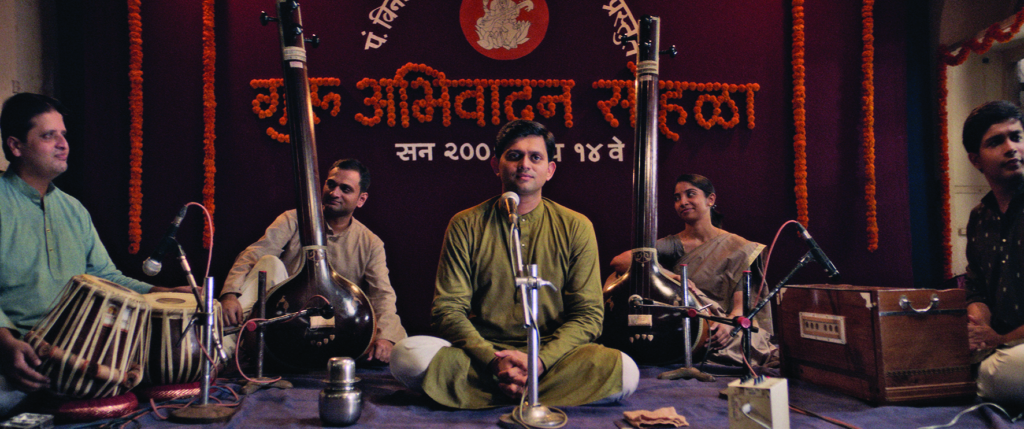
And, like his central character, Tamhane has had to confront the structural realities of his chosen artform. After the success of Court, people told him that he’d find it easier to get funding for his second film, but that turned out not to be the case.[19]See Sharma, ibid. For all his belief in the magic of cinema, and in cinema as a form of magic, Tamhane is yet another disciple trying to maintain the purity of his artistic output, to be allowed to pursue his dreams in the face of contemporary realities, to make something defiantly non-commercial yet still financially feasible.
In The Disciple, in a years-on coda, Sharad has ultimately found acceptance, and perhaps even happiness: rather than losing himself in monastic, sexless pursuit of an ascetic artform, he now has a wife and daughter, and is devoting himself to making vast archives of old recordings of unknown classical masters available (on USB!) to modern-day listeners. In real life, Modak – the first-time actor who so brilliantly portrays this conflicted central character across decades – is a master classical musician who earns his living as an accountant.[20]See Madhusree Ghosh, ‘Chaitanya Tamhane, Just Back from Venice, Talks Film, Fandom and Art’, Hindustan Times, 18 September 2020, <https://www.hindustantimes.com/art-and-culture/chaitanya-tamhane-just-back-from-venice-talks-film-fandom-art/story-3yUAVfJeaSJ51MnIqMg38J.html>, accessed 26 July 2021. And Tamhane, too, has found a middle ground: The Disciple was filmed entirely on his terms with ‘zero compromises’,[21]Tamhane, quoted in Mukherjee, op. cit. and is an unwavering art movie made in Marathi (only the fourth-most spoken language in India, meaning that it’ll be subtitled even in his homeland) that unspools at a meditative pace. It’s a work of rapturous, minimalist filmmaking that begs to be seen in the temple of the cinema, but instead is solely available to be witnessed via that least holy of motion-picture forums: Netflix.
Endnotes
| 1 | Chaitanya Tamhane, quoted in Indulekha Aravind, ‘Now We Don’t Look at Cinema as an Art Form, but as Fast Food: Chaitanya Tamhane’, The Economic Times, updated 4 October 2020, <https://economictimes.indiatimes.com/magazines/panache/now-we-dont-look-at-cinema-as-an-art-form-but-as-fast-food-chaitanya-tamhane/articleshow/78459736.cms>, accessed 14 July 2021. |
|---|---|
| 2 | Laya Maheshwari, ‘Why Court Writer and Director Chaitanya Tamhane Doesn’t Think You Can Judge His Intentions’, IndieWire, 14 July 2015, <https://www.indiewire.com/2015/07/why-court-writer-and-director-chaitanya-tamhane-doesnt-think-you-can-judge-his-intentions-247837/>, accessed 14 July 2021. |
| 3 | Aravind, op. cit. |
| 4 | Chaitanya Tamhane, quoted in Leonardo Goi, ‘Searching for the Truth: Chaitanya Tamhane on The Disciple’, Notebook, 14 October 2020, <https://mubi.com/notebook/posts/searching-for-the-truth-chaitanya-tamhane-on-the-disciple>, accessed 14 July 2021. |
| 5 | Tamhane, quoted in Aravind, op. cit. |
| 6 | Chaitanya Tamhane, quoted in Tatsam Mukherjee, ‘The Disciple Is an Expensive Film and I Was Allowed to Make It with Zero Compromises’, Firstpost.com, 29 April 2021, <https://www.firstpost.com/entertainment/the-disciple-is-an-expensive-film-and-i-was-allowed-to-make-it-with-zero-compromises-chaitanya-tamhane-8703021.html>, accessed 22 July 2021. |
| 7 | See ‘Chaitanya Tamhane and Vivek Gomber on The Disciple’, IMDb on the Scene, 7 May 2021, <https://www.imdb.com/video/vi2832449561>, accessed 23 July 2021. |
| 8 | See ‘Noted Marathi Filmmaker Sumitra Bhave Dies Due to Lung Infection’, Hindustan Times, 19 April 2021, <https://www.hindustantimes.com/cities/pune-news/noted-marathi-filmmaker-sumitra-bhave-dies-due-to-lung-infection-101618807590321.html>, accessed 23 July 2021. |
| 9 | See Devarsi Ghosh, ‘“An Emotional, Universal Film”: Chaitanya Tamhane on His New Film The Disciple’, Scroll.in, 8 August 2020, <https://scroll.in/reel/969440/an-emotional-universal-film-chaitanya-tamhane-on-venice-bound-the-disciple>, accessed 23 July 2021. |
| 10 | Chaitanya Tamhane, quoted in Bedika, ‘Full-length Interview: Marathi Director Chaitanya Tamhane on Alfonso Cuaron’s Offer and His Film Court Winning Big at Venice’, The New Indian Express, 9 August 2020, <https://www.indulgexpress.com/entertainment/cinema/2020/aug/09/full-length-interview-marathi-director-chaitanya-tamhane-on-alfonso-cuarons-offer-and-his-film-cou-27212.html>, accessed 23 July 2021. |
| 11 | Tamhane, quoted in Goi, op. cit. |
| 12 | Chaitanya Tamhane, quoted in Devarsi Ghosh, op. cit. |
| 13 | See, for example, Deborah Young, ‘The Disciple: Film Review’, The Hollywood Reporter, 4 September 2020, <https://www.hollywoodreporter.com/movies/movie-reviews/the-disciple-film-review-venice-2020-4052937/>; and Kaleem Aftab, ‘The Disciple: Chaitanya Tamhane Considers the Limits of Control’, Sight & Sound, 8 October 2020, <https://www.bfi.org.uk/sight-and-sound/reviews/disciple-chaitanya-tamhane-indian-classical-music-vocalist-student>, both accessed 26 July 2021. |
| 14 | Chaitanya Tamhane, quoted in Shilajit Mitra, ‘Chaitanya Tamhane on The Disciple: We All Start Out as Dreamers’, Cinema Express, 5 May 2021, <https://www.cinemaexpress.com/stories/interviews/2021/may/05/chaitanya-tamhane-on-the-disciple-we-all-start-out-as-dreamers-24341.html>, accessed 26 July 2021. |
| 15 | Whom I, in defence of critics, see not as some villainous killer of dreams, but as a vessel delivering unvarnished truths. |
| 16 | Tamhane, quoted in Mukherjee, op. cit. |
| 17 | See Aravind, op. cit. |
| 18 | Chaitanya Tamhane, quoted in Priyanka Sharma, ‘The Disciple Director Chaitanya Tamhane: Alfonso Cuaron Helped Me Find My Voice’, The Indian Express, 13 September 2020, <https://indianexpress.com/article/entertainment/entertainment-others/alfonso-cuaron-helped-me-find-my-voice-chaitanya-tamhane-6540990/>, accessed 26 July 2021. |
| 19 | See Sharma, ibid. |
| 20 | See Madhusree Ghosh, ‘Chaitanya Tamhane, Just Back from Venice, Talks Film, Fandom and Art’, Hindustan Times, 18 September 2020, <https://www.hindustantimes.com/art-and-culture/chaitanya-tamhane-just-back-from-venice-talks-film-fandom-art/story-3yUAVfJeaSJ51MnIqMg38J.html>, accessed 26 July 2021. |
| 21 | Tamhane, quoted in Mukherjee, op. cit. |
